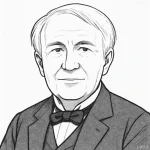“There is no such thing as accident; it is fate misnamed.”

- August 15, 1769 – May 5, 1821
- French of Italian descent
- French military officer and emperor
table of contents
Quote
“There is no such thing as accident; it is fate misnamed.”
Explanation
Napoleon Bonaparte’s statement reflects a belief in destiny and the idea that events, often attributed to chance or accident, are instead part of a larger, preordained plan. By calling accident “fate misnamed,” he implies that what may seem random or coincidental is actually influenced by forces beyond our control or understanding. This perspective aligns with Napoleon’s strategic mindset—he viewed life as a series of calculated moves within a framework of destiny, where outcomes were not truly random but the result of hidden purposes.
This view encourages a reflective approach to life’s unexpected events. In a modern context, many people find comfort in seeing setbacks or successes as part of a larger plan, helping them to make sense of challenges and persevere through adversity. For example, missing out on an opportunity may later reveal itself as a necessary redirection toward something better, giving the impression of fate at work.
Napoleon’s perspective serves as a reminder to embrace life’s unpredictability with resilience. Instead of feeling overwhelmed by accidents or misfortunes, seeing them as part of a broader destiny can inspire acceptance and adaptability. This approach encourages us to look for meaning and growth in all experiences, recognizing that setbacks and surprises often shape our paths in unexpected and sometimes beneficial ways.
Would you like to share your impressions or related stories about this quote in the comments section?




